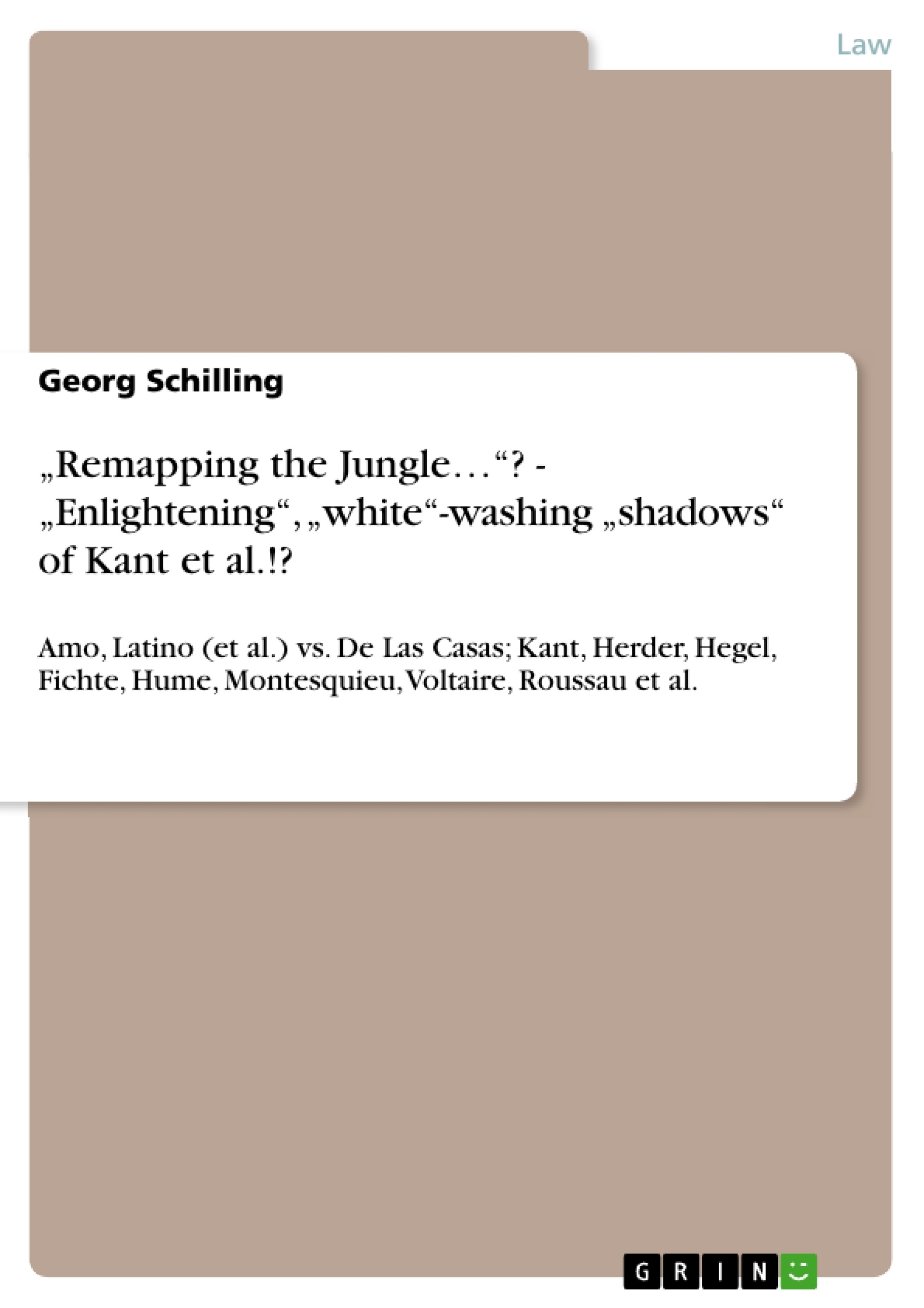Who was Anton Wilhelm AMO ? Was KANT a "saint"? Is KANT "trustworthy"? Was DE LAS CASAS "trustworthy"? These questions arose when one of my former colleagues, Prof Dr Martin SPITZER voiced a critical question with respect to DE LAS CASAS in one of his highly interesting courses. It was not only SPITZER but also the wish to send my dead relative Em Prof Dr Kurt SCHUBERT who founded the departement for Jewish Studies at the University of Vienna a "message" about the importance of being critical about basically all too often quite "convergently" presented (pseudo-)facts e.g. with respect to KANT.
Inhaltsverzeichnis (Table of Contents)
- Introduction
- Introduction
- „Tenor(s)“ of the study
- („Holy“?) Bartolomé DE LAS CASAS
- Who was DE LAS CASAS?
- DE LAS CASAS and human rights „development“!?
- Juan LATINO (Juan DE SESA)
- Who was Juan LATINO?
- LATINO: unknown to KANT?!
- Anton Wilhelm AMO
- Who was Anton Wilhelm AMO?
- AMO and the „Ding an sich“ (noumenon)?
- NTEP on AMO and implications?
- AMO: unknown to KANT!?
- David HUME
- „Enlightening“ David HUME at „WU WIEN“?
- Gilles DELEUZE on HUME?
- HAYEK and „unser weiser Führer“ David HUME?
- DAIRE and MOLINARI on HUME?
- Gerhard STREMINGER on HUME?
- Race/“Rasse“; „Rassengesetze“; Racism/“Rassismus“
- Definition of „Rasse“ with BROCKHAUS?
- Definition of „Rasse“ with BROCKHAUS?
- Definition of „Rassismus“ with BROCKHAUS?
- Immanuel KANT
- KANT on Africo-American people anno 1764 (1766)?
- Again: KANT on Afro-americans anno 1766?
- KLEIN on KANT’s „scharfe Beobachtungsgabe“?
- Wolbert G. C. SMIDT on KANTS „Erhabenes“?
- Patrick FRIERSON on KANTS „Erhabenes“?
- Monika FIRLA on KANT and „Zeitgeist‘-fiction? ..
- KANT, Afro-americans and „phlogiston“ anno 1785?
- (Sir) Isaiah BERLIN on KANT?
- BERLIN on KANT’s „scharfer und äußerst klarer Verstand“?
- KANT: „Meister der Architektonik der Vernunft“ (GADAMER)?
- WIMMER on KANT and Wilhelm Anton AMO? ..
- Helmut FUCHS on KANT?
- Christof MÜLLER on KANT?
- Nikolaus FRANKE on KANT?
- Anna GAMPER on KANT ?
- Fritz SCHEBECK on KANT?
- PERTHOLD/SPITZER/WALLNER on KANT?
- Thomas OLECHOWSKI on KANT?
- Gerhard LUF on KANT?
- Again: Gerhard LUF on KANT?
- Alexander SOMEK on KANT, HEGEL and ROUSSEAU?
- RÜPING/JEROUSCHEK on KANT?
- Fritz SCHEBECK on KANT?
- PERTHOLD/SPITZER/WALLNER on KANT?
- Thomas OLECHOWSKI on KANT?
- Gerhard LUF on KANT?
- Again: Gerhard LUF on KANT?
- Alexander SOMEK on KANT, HEGEL and ROUSSEAU?
- RÜPING/JEROUSCHEK on KANT?
- HEGEL…
- RÜPING/JEROUSCHEK on HEGEL?
- COOTER/ULEN on HEGEL?
- WIMMER on HEGEL?
- Karl LARENZ and the NS-regime.......
- Karl LARENZ on KANT?
- RÜPING/JEROUSCHEK on LARENZ?
- Thomas OLECHOWSKI on LARENZ?
- Conclusion and „Outlook“?
Zielsetzung und Themenschwerpunkte (Objectives and Key Themes)
This work seeks to conduct a serious and scientific analysis of often unmentioned facts surrounding Immanuel Kant and other influential figures. The text aims to provide a nuanced understanding of their views, particularly concerning issues related to race, philosophy, and historical context. The analysis is likely to challenge conventional interpretations and highlight potentially overlooked aspects of these thinkers. * Examining the historical context and contributions of influential figures like Immanuel Kant, David Hume, and Hegel. * Analyzing the role of race and racism in the philosophical discourse of the Enlightenment. * Exploring the “shadows” of Enlightenment thinkers and their potential biases or shortcomings. * Evaluating the impact of these thinkers on contemporary thought and societal issues. * Investigating how the intellectual landscape of the Enlightenment continues to influence modern discussions on race and equality.Zusammenfassung der Kapitel (Chapter Summaries)
The work begins with an introduction that sets the stage for the study. It questions the dominant narratives surrounding figures like Kant and Hegel, challenging the often-presented solely positive portrayals. The following chapters delve into the lives and works of various thinkers: Bartolomé de las Casas, Juan Latino, Anton Wilhelm Amo, and David Hume. Each chapter examines their contributions and potentially overlooked aspects, particularly concerning their views on race and human rights. The text subsequently focuses on Kant, providing detailed analysis of his writings and potential biases regarding Afro-Americans. The work further explores the influence of Kant and Hegel on later thinkers and their involvement in Nazi ideology.Schlüsselwörter (Keywords)
This work explores a number of key themes, focusing on the intersection of philosophy, race, and the Enlightenment era. The key terms include: Immanuel Kant, David Hume, Hegel, Enlightenment, race, racism, Afro-Americans, human rights, historical context, intellectual history, and critical analysis. The text delves into the complexities of these topics, examining the limitations and contradictions within the intellectual landscape of the Enlightenment and its enduring influence on modern thought.Frequently Asked Questions
What is the "shadow" of Immanuel Kant discussed in this work?
The work analyzes potentially overlooked or unmentioned facts regarding Kant's views on race and his biases toward Afro-American people.
Who was Anton Wilhelm Amo?
Amo was an African philosopher in 18th-century Germany; the text questions whether his work was known to or ignored by Kant.
How does the study view David Hume's contribution to the Enlightenment?
The study provides an "enlightening" but critical look at Hume, analyzing his philosophy alongside critiques by thinkers like Gilles Deleuze and Gerhard Streminger.
What role did Bartolomé de las Casas play in human rights?
De las Casas is examined regarding his trustworthiness and his role in the early development of human rights concepts in a colonial context.
How is the connection between Enlightenment philosophy and later ideologies explored?
The text investigates how the intellectual landscape of figures like Kant and Hegel influenced later discussions on race and even their perception during the Nazi era.
- Arbeit zitieren
- Mag. Georg Schilling (Autor:in), 2009, „Remapping the Jungle…“? - „Enlightening“, „white“-washing „shadows“ of Kant et al.!?, München, GRIN Verlag, https://www.grin.com/document/137483



